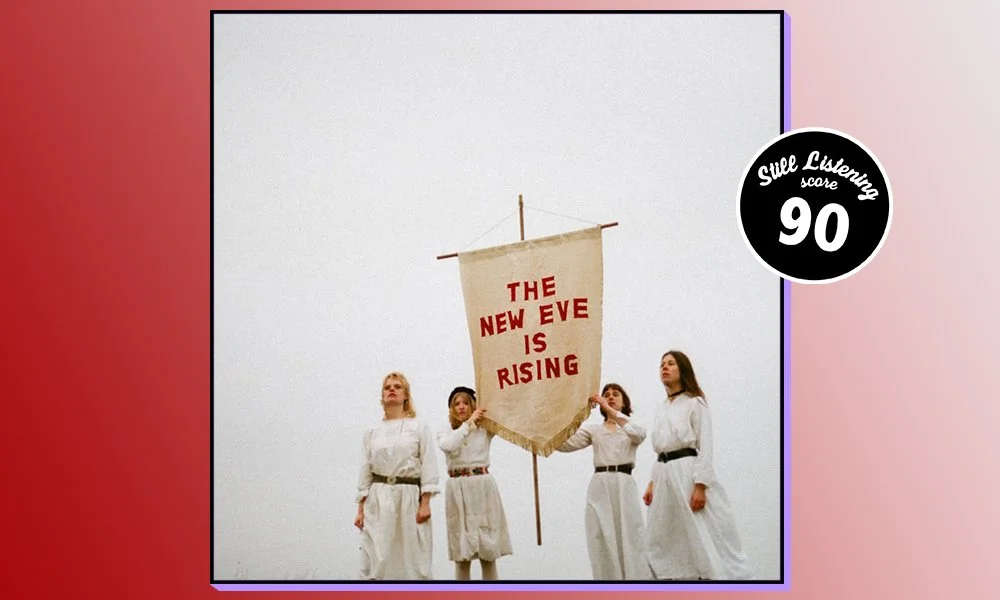The New Eves - The New Eve Is Rising Review
A snarling, spellbound debut that reclaims English folk from the ashes, The New Eves twist tradition into something feral, poetic, and defiantly alive.
The English wild woman remains one of the country's more conflicted myths. The image of the heretic pagan girl attending covens in the hills, being burnt at the stake for crafting remedies with herbs or prancing naked under the moon. Its practitioners cindered away into grim tales or dull erotic fantasies. When they do emerge in the modern day, it's often in the form of artists. Musicians and authors who tap into that same sense of wyrd and wyld, regardless of how much we deny it, run sharply down the nation's backbone. It’s a notion often pacified, the uncanny eeriness of '60s folk groups repackaged as easy listening. Even Angela Carter, whose novel this Brighton quartet shares a name with, has been endlessly diluted. Her Sade-ian erotic surrealism repackaged onto GCSE courses. It's as if England is forever embarrassed by its wildness. Yet the New Eves appear keenly aware that barking isn’t enough to push away a muzzle; you must bite the hand that grasps. Though bite fails to capture the ferocity of their debut, this is modern folk music that gnashes and howls.
Though to call The New Eves a folk act feels inaccurate. While their work is rooted firmly in the rich English tradition of weirdo folk, the core sound that powers their screeching engine is a hypnotic mix of pounding drums and chiming guitars. It's clear from a glance that Brian Eno’s statement that the Velvet Underground inspired every band that bought their record still rings true. There’s screeching Cale like violin drones, spoken word poetry, and drummer Ella Russell even smashes out her rhythms standing up like Moe Tucker. The band carries a great deal of proto-punk in their DNA, mixing the ferocious poetics of Patti Smith with the focused repetition of the Modern Lovers and Ramones, but that’s merely the band's bones. Their flesh is rather a rich tapestry of distinct British weirdness.
Opener ‘The New Eve’ is a rising and rousing slab of poetry that acts as both an introduction and a mission statement. It presents the titular New Eve as an apocalyptic saviour of folkloric rebirth who has ‘risen from the pages of a burning bible’ and ‘grabbed the flaming sword from the jealous angels’. The band's vision carries forth the spiritual grandeur of David Tibbet but repurposes around a far more direct and visceral sound. The pounding drums and writhing violins sound like the ground splitting open to reveal a figure of truly divine femininity.
Across the record figures of female power takes centre stage. The driven motorik ballad ‘Highwayman’ repurposes Alfred Noyes' poem of the same name into a piece of countryside grindhouse centred around the titular Highwayman's lover. ‘Astrolabe’ is another grimly romantic ballad of droning violins where the narrator asks if their lover will ‘be the bonnie to my clyde’, suggesting that they can ‘just drive’. Movement and nature are recurring images that the bands focus on, as a clear rejection of the modern world. Rather than dwelling in the pain of modernity, they instead craft their distinct domain.
There are hints of the poetry of Thomas and the other New Apocalyptics, the writings of Carter and Quinn rattling against the proto-freak folk of Comus, but comparison is the thief of joy in the case of The New Eves. The sound they craft is distinct and unpredictable on ‘Cow Song’; they leap from slow-building pastoral imagery to a breakdown of howled group vocals and shredded strings. Yet elsewhere they're quietly contemplative, such as the gorgeous slow ballad ‘Mid Air Glass’, which feels as fragile yet destructive as Joanna Newsom's best. The album's highlight might be its most tender moment, the gorgeous ‘Mary’, an utterly heartbreaking ballad that shows the band's greatest strength, their attention to detail. It's rattling marching drums, gashes of guitar noise, mournful accordion, and the vocals' perfect intonation, knowing precisely when to hit the right line. Those vocals are the band's secret weapon; their switches from a coven-like chanting to rising spoken word are executed with precision and care. To some listener, their rawness may appear jarring, but like the rest of the album, they feel like nature's greatest pleasures. Wild, gritty, and raw.
It’s all these little decisions that cause The New Eve Is Rising to be such a remarkably confident debut in a year full of confident debuts. Even in a moment brimming with intriguing reinterpretations of folk, of miniature orchestras and screeching poetic voices, The New Eves stand apace as a band making something genuinely new. A gorgeously tangled and twisted vision of folk rock that bears hints of the rich history that surrounds it yet never feels revivalist despite its lack of modernity. Rather, it’s the sound of a new history being crafted from the old. It's ironic that the final tracks are named ‘Rivers Run Red’ and ‘Volcano’ because The New Eve's music flows like lava. Thick, primordial, and groggy, that leaves you standing agape, trying to make sense of it until you realise it's too late, their sound has already engulfed you.

